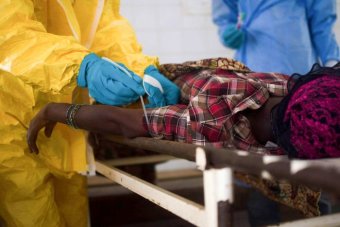Three of the world’s leading Ebola specialists have called for experimental drugs and vaccines to be offered to people in West Africa affected by an outbreak of the deadly virus…report by ABC News
Noting that American aid workers who contracted Ebola in Liberia were given an unapproved medicine before being evacuated to the US, the specialists – including Peter Piot, who co-discovered Ebola in 1976 – said Africans affected by the same outbreak should get the same chance.
Dr Piot, David Heymann and Jeremy Farrar – all influential infectious disease professors – said there were several antiviral drugs, monoclonal antibodies and vaccines under study for possible use against Ebola.
“African governments should be allowed to make informed decisions about whether or not to use these products – for example to protect and treat healthcare workers who run especially high risks of infection,” they wrote in a joint statement.
The World Health Organisation (WHO), “the only body with the necessary international authority” to allow such experimental treatments, “must take on this greater leadership role”, they said.
“These dire circumstances call for a more robust international response,” they added.
Almost 900 people in Guinea, Sierra Leone and Liberia have been killed by Ebola and more than 1,600 infected since the virus started spreading in Guinea in February.
Experimental drug shows some success
Two American aid workers who fell sick with Ebola in Liberia saw their conditions improve by varying degrees after they received an experimental drug called ZMapp, developed by San Diego-based private biotech firm Mapp Biopharmaceutical.
Nancy Writebol, 59, has arrived in the US after being flown from Liberia and is being treated by infectious disease specialists at Emory University Hospital in Atlanta.
Ms Writebol is in the same isolation ward as Kent Brantly, 33, an Ebola-infected American doctor who was able to walk into the hospital when he arrived by ambulance on Saturday.
The pair are believed to be the first Ebola patients ever treated in the US, and health officials have said the virus does not pose a significant threat to the public.
Dr Piot, Dr Farrar and Dr Heymann questioned why Africans were not being given the same chance to try the experimental drug.
If the deadly virus was raging though wealthy countries, they said, medical agencies “would begin discussions with companies and labs developing these products and then make rapid decisions about which of them might be appropriate for compassionate use”.
“Experimental treatments shouldn’t be rolled out generally without prior safety testing,” they said in their statement.
“But in the face of the critical challenge in West Africa, the WHO and Western medical agencies should be helping countries weigh the risks and benefits of limited deployment of the best [drug and vaccine] candidates to those in the greatest need, while continuously monitoring safety and efficacy.”
A spokesman for the Geneva-based WHO said it “would not recommend any drug that has not gone through the normal process of licensing and clinical trials”.
Relatives dumping bodies in Streets to avoid quarantine
In the Liberian capital of Monrovia, relatives of Ebola victims defied government quarantine orders by dumping infected bodies in the streets, officials said.
Information minister Lewis Brown said some people may be alarmed by regulations imposing the decontamination of victims’ homes and the tracking of their friends and relatives.
With less than half of those infected surviving the disease, many Africans regard Ebola isolation wards as death traps.
“They are therefore removing the bodies from their homes and are putting them out in the street. They’re exposing themselves to the risk of being contaminated,” Mr Brown said.
“We’re asking people to please leave the bodies in their homes and we’ll pick them up.”
In Sierra Leone and Liberia, where the outbreak is now spreading fastest, authorities have deployed troops to quarantine the border areas where 70 per cent of cases have been detected.
A presidential aide from Sierra Leone said the soldiers would “deter relatives and friends of suspected and Ebola patients from forcefully taking them from hospitals without medical consent”.
Complete and Original Post by ABC News



